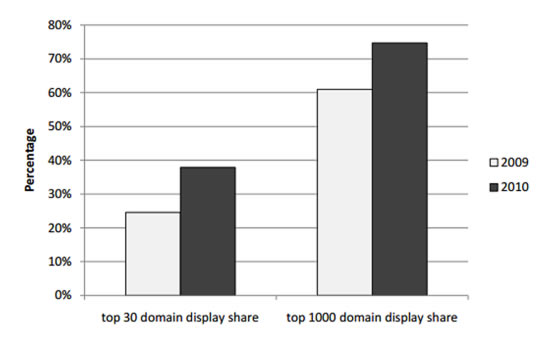Does Your Domain Say “Trust Me?”
Do web searchers pay attention to the domain where the link in the search results leads them? A few years ago, I would have said “no.” For years, I’ve operated or advised websites that ranked at or near the top for various brand names, and found many users assumed the site WAS that brand. Even the most cursory look at either the domain or the site itself would show the site to be unaffiliated with the brand, but oblivious visitors would post inquiries about customer service problems, purchase locations, and so on.
Now, it seems, more web searchers are paying attention to what’s in the URL. A study by Stanford and Microsoft researchers shows that domains are becoming a potent force in consumer click behavior. In a test they compare to a “Pepsi/Coke blind taste test,” they found that domains could flip a user’s preference 25% of the time.
Big Domains Dominate Search
The study notes that “Top 30” domains increasingly dominate search results:

This concentration would seem to create a self-reinforcing trend. If the top handful of sites get more clicks and create more user engagement, they will rise even higher in the rankings due to Google’s emphasis on such metrics as part of its post-Panda ranking algorithm.
Trust, Credibility Drive Clicks

One of the comparisons performed by the researchers was to label search results as being from webmd.com, a popular and trusted health site, or genetichealth.com, an unfamiliar site. By presenting the search results labeled with these domains with alternating snippets and positions, the effect of the domain could be tested. Results that appeared to be from webmd.com got clicked more often, even when the actual content of the search title/snippet was switched with the lesser-known domain. (This is eerily reminiscent of the experiments showing people preferred soda labeled as Coca Cola, whether they were drinking Coke or Pepsi!)
Position, Relevance, & Domain
The position in the ranked results is still significant, as is the relevance of the displayed content to the searcher’s intent. What these experiments show is that the domain is now emerging as a factor of importance as well. A popular site can’t disregard search engine optimization and expect to get clicked even though it’s farther down the page. It’s still necessary to have diverse and useful content, too, as part of an overall SEO and content marketing strategy.
Marketing Implications
The authors of the study focus on the issue from the perspective of search engines, but there are implications for marketers there too. One big takeaway is that life is getting tougher for marketers with lesser-known domains. First, it’s increasingly hard to rank well for popular search terms; it’s been many years since an SEO-savvy site-builder could publish a few pages and outrank the top brands for competitive terms. It appears that the most popular domains continue to gain ground against anyone else.
Second, even if a lesser-known domain claws its way to the top few results, it will face an uphill battle if the other results are branded domains familiar to consumers.
Here are a few quick prescriptions for marketers:
- If you have a domain name known to consumers, exploit that advantage by adding content and employing good SEO strategies and architecture. Site traffic will grow, and the process will reinforce itself.
- If your domain is unknown, focus on improving your rankings and your displayed info (title/snippet) to offset the domain bias effect. Position and relevance still drive clicks.
- Work to build your domain as a brand. Over time, you’ll gain clicks.
- Be wary of starting microsites on new domains. Trust/credibility will be higher on a recognized domain.
In short, use domain bias to your advantage if you can. If not, then recognize that better-known domains will siphon away your search traffic and strive to improve relevance, rankings, and, over time, your branding.
